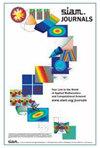Large Deviation Theory-based Adaptive Importance Sampling for Rare Events in High Dimensions
IF 1.9
3区 工程技术
Q2 MATHEMATICS, INTERDISCIPLINARY APPLICATIONS
引用次数: 0
Abstract
SIAM/ASA Journal on Uncertainty Quantification, Volume 11, Issue 3, Page 788-813, September 2023.Abstract. We propose a method for the accurate estimation of rare event or failure probabilities for expensive-to-evaluate numerical models in high dimensions. The proposed approach combines ideas from large deviation theory and adaptive importance sampling. The importance sampler uses a cross-entropy method to find an optimal Gaussian biasing distribution, and reuses all samples made throughout the process for both the target probability estimation and for updating the biasing distributions. Large deviation theory is used to find a good initial biasing distribution through the solution of an optimization problem. Additionally, it is used to identify a low-dimensional subspace that is most informative of the rare event probability. This subspace is used for the cross-entropy method, which is known to lose efficiency in higher dimensions. The proposed method does not require smoothing of indicator functions nor does it involve numerical tuning parameters. We compare the method with a state-of-the-art cross-entropy-based importance sampling scheme using three examples: a high-dimensional failure probability estimation benchmark, a problem governed by a diffusion equation, and a tsunami problem governed by the time-dependent shallow water system in one spatial dimension.
基于大偏差理论的高维罕见事件自适应重要性抽样
SIAM/ASA Journal on Uncertainty Quantification, vol . 11, Issue 3, Page 788-813, 2023年9月。摘要。我们提出了一种方法,以准确估计罕见事件或失效概率昂贵的数值模型在高维。该方法结合了大偏差理论和自适应重要抽样的思想。重要性采样器使用交叉熵方法寻找最优高斯偏倚分布,并在整个过程中重用所有样本用于目标概率估计和偏倚分布的更新。利用大偏差理论,通过求解一个优化问题,找到一个良好的初始偏置分布。此外,该方法还用于识别稀有事件概率信息量最大的低维子空间。该子空间用于交叉熵方法,已知交叉熵方法在高维中会失去效率。该方法不需要对指示函数进行平滑处理,也不涉及数值整定参数。我们使用三个例子将该方法与最先进的基于交叉熵的重要性抽样方案进行比较:一个高维失效概率估计基准,一个由扩散方程控制的问题,以及一个空间维度上由时间相关的浅水系统控制的海啸问题。
本文章由计算机程序翻译,如有差异,请以英文原文为准。
求助全文
约1分钟内获得全文
求助全文
来源期刊

Siam-Asa Journal on Uncertainty Quantification
Mathematics-Statistics and Probability
CiteScore
3.70
自引率
0.00%
发文量
51
期刊介绍:
SIAM/ASA Journal on Uncertainty Quantification (JUQ) publishes research articles presenting significant mathematical, statistical, algorithmic, and application advances in uncertainty quantification, defined as the interface of complex modeling of processes and data, especially characterizations of the uncertainties inherent in the use of such models. The journal also focuses on related fields such as sensitivity analysis, model validation, model calibration, data assimilation, and code verification. The journal also solicits papers describing new ideas that could lead to significant progress in methodology for uncertainty quantification as well as review articles on particular aspects. The journal is dedicated to nurturing synergistic interactions between the mathematical, statistical, computational, and applications communities involved in uncertainty quantification and related areas. JUQ is jointly offered by SIAM and the American Statistical Association.
 求助内容:
求助内容: 应助结果提醒方式:
应助结果提醒方式:


